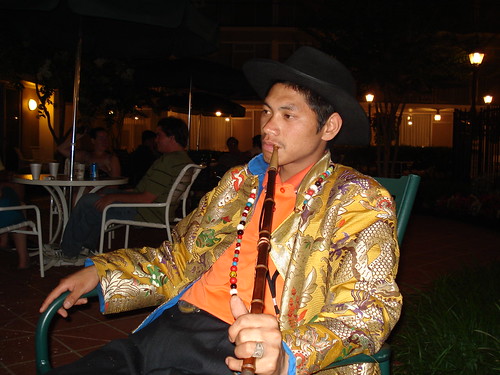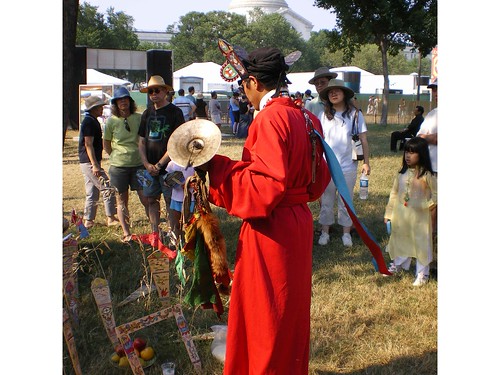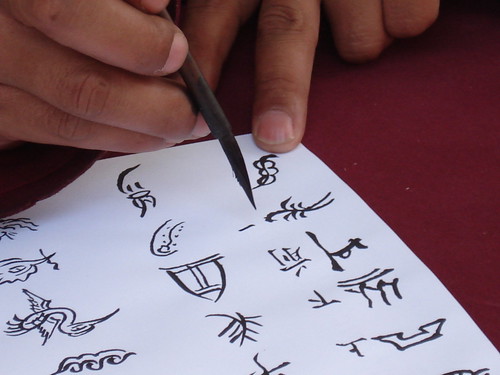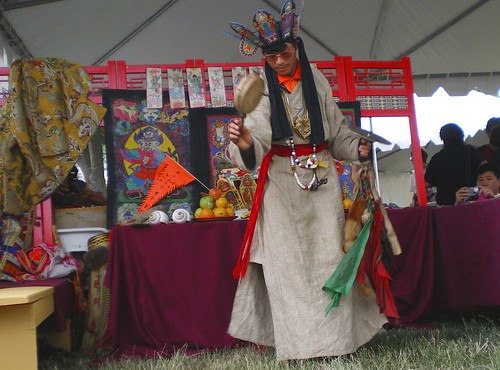 Another person from the folklife festival that I’d like to profile is He Xiudong. Mr. He is a Dongba, which is sort of like a priest for the Naxi People in northwest
Another person from the folklife festival that I’d like to profile is He Xiudong. Mr. He is a Dongba, which is sort of like a priest for the Naxi People in northwest The duties, rituals and knowledge of the Dongba are passed from father to son, and at one time there were many active lineages of these priests. The rituals they perform are animistic in nature, making offerings to various gods and the spirits of nature. As the story goes, man and shv (spirits of nature) were half brothers, with man given domain over all domestic life, and shv given domain over all of nature. They used to live in harmony, but the shv became angered by man’s constant intrusions into the natural realm, and the wanton destruction of their property (ie trees, waterways etc). The chief role of the Dongba is to mediate between the people and the shv, so that angry shv will not cause earthquakes, storms, avalanches and other forms of natural mayhem.
The other role of the Dongba is as the carrier of the Naxi People’s cultural knowledge. Their main tool in this role is the Dongba pictographic script, which is the only such script still in use today. Many of the Dongba scriptures write out the numerous steps of each Dongba ritual, but there are many other types of scriptures as well. Some contain medicinal knowledge, while others contain histories, myths and stories of the Naxi people. Traditionally, only the Dongba would learn the pictographic script. Thousands of the scriptures found their way to the library of Congress, where they are being digitally catalogued. You can view them here
And now, back to He Xiudong. Mr. He comes from a long line of Dongbas in a village in Tacheng, along the upper reaches of the
He Xiudong learned the traditions of the Dongba from his grandfather and other family members of that generation. His family was once a very large clan of important Dongba, but now only he remains. His training was incomplete, as there wasn’t enough time, but he spends much of his time these days scouring the countryside for Dongba scriptures and practicing Dongbas. He also collaborates with the Dongba Research Institute, a government supported organization dedicated to the preservation of this tradition.
These days there are only a handful of Dongbas left, and almost all of them are in their seventies and eighties. One of the most striking things about He Xiudong is that he is only 27.
He came with us to the folklife festival to represent Naxi culture. He is not a performer, though we got him on stage a few times to sing a traditional drinking song. His main role was to perform a ritual offering at the festival, which he did several times.
There’s an interesting story here. The original plan was for him to perform an ablution ceremony, where he blessed and ritually cleansed an area including a gate made of woven bamboo, through which onlookers could walk to become blessed. He sent a detailed list of the things he needed and instructions on how to prepare the area, but much of it was lost along the way. On the first day of the festival, we scrambled all over the place looking for everything he needed. When we were getting close, he looked at me and said, “where’s my chicken?” He figured it was common knowledge that a chicken had to be sacrificed for the ceremony. Anyone who is familiar with the state of affairs in America today knows that there’s no way the Smithsonian could get away with ritually sacrificing an animal on the mall every day for two weeks, respect for religion be damned. It took Mr. He quite a while to find a ritual that didn’t call for ritual slaughter, but he eventually settled for an offering to the shv, which could be done with rice and fruits.
On and off-site, He Xiudong’s charisma quickly became the stuff of legend among festival participants and staff. He can’t speak a word of English, and even his Chinese is pretty shaky, but he made friends and fans everywhere he went. Sulking around in his robes, beads and black hat with a three-foot-long bamboo pipe hanging out of his mouth, people began to gather around him wherever he went. I did my best to translate for him as he interacted with the other people around him, but I also made an effort to make myself scarce whenever possible. He turned out to have an uncanny capacity for wordless communication, and everyone seemed to have more fun when I was gone.
By the end of the festival, people were lining up to wish him well and bestow him with gifts of beads, feathers, homegrown tobacco and the like. One guy even pinned a dollar to his robe in old-school New Orleans Mardi Gras style. There was a general consensus among everyone: this guy’s the shit!
I was touched by his ability to reach out, but even more so by his dedication to the traditions of his people. At a time when many Naxi youth are either diving into modern consumer culture or assisting in the commoditization of their own cultural heritage (I’ve actually seen a Budweiser poster with Dongba pictographs in Lijiang), he is staying the course, and reviving the spirit of a people against impossible odds



No comments:
Post a Comment